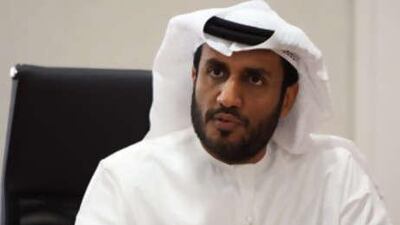ABU DHABI // The UAE's neutral foreign policy has given the country enormous credibility when providing emergency relief to neighbouring countries, the Emirates' Red Crescent Authority's secretary general said yesterday.
Such aid can help promote education, health and employment and combat extremism, Mohammed al Qamzisaid. In a wide-ranging interview, he provided details of the organisation's work in the region, its efforts to battle poverty and disease, its attempts at increasing transparency and the difficulties of getting aid to nations embroiled in conflict. All that is possible, he said, because of the perception that the UAE "moves without an external agenda in the countries in which it operates".
"The credit goes to the political leadership of the UAE, which adopts the concept of neutrality and the prosperity of all people regardless of belief or faith," he said. The RCA has projects worth Dh210 million in Palestinian territories, Pakistan, Afghanistan and Yemen, Mr al Qamzi said. It builds housing for Palestinian refugees in Jordan, Lebanon and Syria, as well as in the West Bank and Gaza Strip, where 70 per cent of Palestinian residents are refugees. A housing district and a hospital are also being built in the West Bank, along with another medical centre in Nablus.
The RCA also runs the only clinic at Al Aqsa Mosque in Jerusalem, Mr al Qamzi said. "It is the only outlet that provides medical services at the mosque, and unfortunately this area sees a lot of conflict between worshippers and Israeli forces," he said. Clashes erupted there yesterday after a Jewish settlement guard shot a Palestinian dead in East Jerusalem and Israeli police entered the mosque compound to quell rioting.
In Yemen, the UAE is building Sheikh Khalifa bin Zayed City in Hadhramaut, constructing 1,000 homes of mud using local labour. The country has helped build a psychiatric hospital and dug hundreds of wells in Afghanistan and sponsors hundreds of orphans in Pakistan. The most significant difficulty facing the RCA in the region is the "lack of stability, struggle between different sides", he said. "If you want to build a number of houses, you see competing forces, each project under the opposition is seen as weakening them," Mr al Qamzi said.
But he added that "our primary role is to be neutral". And the UAE's neutrality is a vital component of its aid operations. The Red Crescent is tasked with developing communities where "conflict is rife, so that security takes hold, and that will only occur if there is justice and neutrality", he said. With the right balance "we can succeed in winning the confidence of all sides and carrying out these projects".
But the authority must rely on local players like the Afghan Red Crescent to provide guidance in setting up projects, because they know the lay of the land. Even with assistance, though, some challenges remain too perilous. The RCA's presence in Afghanistan, for example, is limited to relatively safe havens and it has no presence in Iraq or Somalia, where security is precarious. "We cannot send people, along with other international organisations, where death is almost certain," he said.
Still, the RCA hopes to be part of the rebuilding of Iraq, Mr al Qamzi said, and the organisation wants to be in the country "by tomorrow, or even today". Most crises the agency has dealt with pale by comparison with the disaster in Pakistan, however, where the UN estimates that about 20 million people have been affected by recent flooding. "Some of the places remained drowned for a month, and this needed the use of helicopters," he said. "We couldn't move on the ground."
As a Muslim and Arab country, the UAE also enjoys greater credibility when providing aid to poor Muslim countries. Being Muslim "allows us to be closer culturally - we understand the religion, the traditions", he said. A lot of these areas harbour "religious polarisation" and a tribalistic way of thinking, yet trust the UAE as a country "that has not gone to war against anyone, and does not support one side against the other". That is useful, he said, because the Red Crescent's role in providing community development and supporting women and children can help combat extremism.
"Extremism and any other negative phenomenon is a result of a lack of justice or unemployment, and extremism can be religious extremism, nationalist, gender-based, or through reliance on drugs," he said. Mr al Qamzi reiterated the UAE's commitment to Pakistan, where the RCA has launched vaccination drives and construction projects. "The presence of the Emirati Red Crescent in Pakistan will be for years," he said, adding that the authority was waiting for reports from the Pakistani authorities on the country's needs before allocating money for more projects.
Mr al Qamzi stressed the need for transparency in how donors' money is spent. The RCA provides project details to individual donors and quarterly reports on its activities. "We are moving with the money of philanthropists," he said. "They have the right to know and be content so they continue to support us." @Email:kshaheen@thenational.ae


